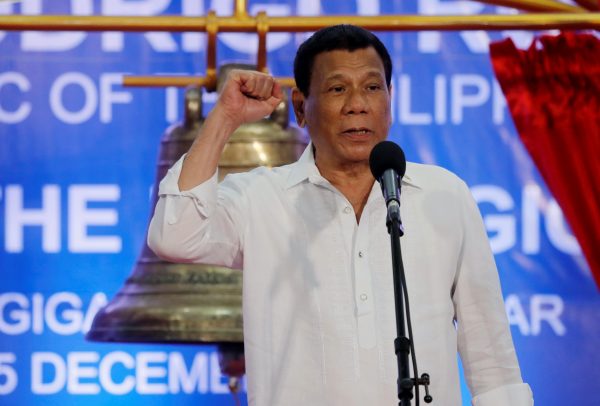Former president Fidel Ramos lobbied Congress to pass an Anti-Terrorism Bill in the 1990s, but was rebuffed due to concerns that the bill would lead to martial law. Ramos’ successor Joseph Estrada — the face of Philippine populism pre-Duterte— embraced the tough-guy credo in both his presidential campaign and his war against rebels in the southern Philippines. Gloria Macapagal-Arroyo used a politicised military to thwart anti-government protests and allegedly abet election fraud in Mindanao.
Duterte has taken the tactics central to the strongman persona to the next level, embracing the use of state-approved violence, blatantly disregarding democratic conventions and curtailing press freedoms. Duterte justifies his authoritarian tendencies by assuming the mantle of reluctant people’s representative against an out-of-touch, broken political system. When he was first elected, voters hoped that Duterte would apply his decisive leadership in Davao to address the complex issues that faced the nation — namely drug abuse, oligarchy and corruption.
Yet Duterte’s iron-fisted governance is not the simplistic, one-size-fits-all answer his supporters hoped for. This has never been more apparent as the Philippines endures the economic and social consequences of the COVID-19 pandemic. Large portions of the urban population live in cramped shanty towns and are daily wage earners, so work-from-home arrangements and social distancing are luxuries many simply cannot afford. Despite imposing one of the world’s strictest lockdowns in March, the Philippines has over 345,000 cases — by far the most in Southeast Asia.
According to the Social Weather Stations, an opinion-polling organisation, the percentage of involuntary hunger has doubled to 16.7 per cent since December 2019. Against this backdrop of dire uncertainty, it is not a shocking revelation that Filipinos have gone to the streets to protest the lack of government aid and relief goods to help keep them afloat.
Duterte constructs an ‘us versus them’ narrative to galvanise support for his administration’s policies. In 2016, his rhetoric against drug abuse pitted national security against the nation’s rampant drug problems. He argued then that a better Philippines could be built on the bodies of thousands of dead addicts and dealers.
His heavy-handed disciplinarian approach was supposed to bring order and security. Duterte tapped into the general frustration of voters who saw existing political actors as ineffective in achieving these goals. But as Julio Teehankee has noted, it is difficult to sustain that same adversarial narrative against an existential threat like a virus.
Duterte’s over-reliance on military leadership in creating a response to the pandemic has been a clear illustration of how his authoritarian tendencies fail to deliver. The pervasiveness of the military is apparent in the government’s response to COVID-19. The Enhanced Community Quarantine measures that the government used during lockdown derives from military border checkpoints used to control the movements of insurgent groups in the Philippines. The ‘Chief Implementer’ of the Philippines’ Declared National Policy Against COVID-19 is a retired general of the Armed Forces.
Likewise, when a group of 70 Filipino doctors cautioned against reopening the economy too hastily and urged the government to ‘draw up a consolidated, definitive plan of action’ against the pandemic, Duterte dared the doctors to mount an uprising against him. Duterte’s speech and actions regarding COVID-19 display a stubborn strongman unwilling to heed advice.
Rather than attempt to form any semblance of a national policy regarding COVID-19, Duterte and his allies have expended political capital on targeting their perceived opponents. They have passed the oppressive Anti-Terror Bill to silence dissent, ended media broadcast network ABS-CBN and threatened to seize the assets of the nations’ leading telecommunications companies. More recently, Duterte has threatened to ban Facebook over its removal of fake, pro-government accounts.
It has become increasingly evident that Duterte’s administration is ill-prepared to address the current social and economic realities facing the Philippines. In a national crisis that has already claimed over 6,000 lives, Duterte’s actions are not just tone-deaf — they are potentially fatal.
Duterte’s government has faced heavy criticism for its response to COVID-19. His politics is built around creating an ‘other’ to blame for national woes. Since it is difficult to ‘blame’ a virus, Duterte has instead targeted unruly quarantine violators. In April, he instructed the military and police to ‘shoot them dead’. Outrage over Duterte’s remarks led #OustDuterteNow to trend worldwide on Twitter with almost 500,000 tweets. This backlash occurred in spite of the fact that anyone who criticises the government online can be subpoenaed by the National Bureau of Investigation.
Despite evidence that points towards an increasing sense of frustration among the general population, the pandemic has not impacted Duterte’s approval ratings. Randy David speculates that fear of government retaliation influences respondents’ answers. Regardless, one thing is certain: The Philippines is losing its battle against COVID-19 and President Rodrigo Duterte has no one left to blame but himself.
Alec Regino is a postgraduate student of sociology at McGill University.
This article is part of an EAF special feature series on the novel coronavirus crisis and its impact.

